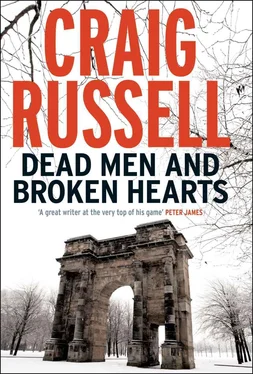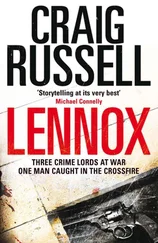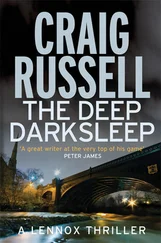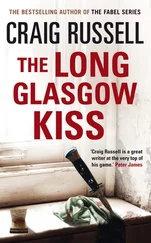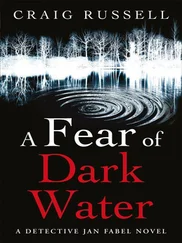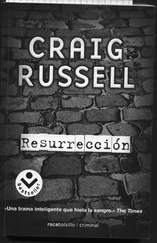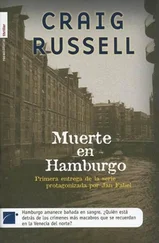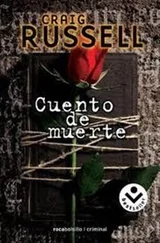Craig Russell - Dead men and broken hearts
Здесь есть возможность читать онлайн «Craig Russell - Dead men and broken hearts» весь текст электронной книги совершенно бесплатно (целиком полную версию без сокращений). В некоторых случаях можно слушать аудио, скачать через торрент в формате fb2 и присутствует краткое содержание. Жанр: Триллер, на английском языке. Описание произведения, (предисловие) а так же отзывы посетителей доступны на портале библиотеки ЛибКат.
- Название:Dead men and broken hearts
- Автор:
- Жанр:
- Год:неизвестен
- ISBN:нет данных
- Рейтинг книги:4 / 5. Голосов: 1
-
Избранное:Добавить в избранное
- Отзывы:
-
Ваша оценка:
- 80
- 1
- 2
- 3
- 4
- 5
Dead men and broken hearts: краткое содержание, описание и аннотация
Предлагаем к чтению аннотацию, описание, краткое содержание или предисловие (зависит от того, что написал сам автор книги «Dead men and broken hearts»). Если вы не нашли необходимую информацию о книге — напишите в комментариях, мы постараемся отыскать её.
Dead men and broken hearts — читать онлайн бесплатно полную книгу (весь текст) целиком
Ниже представлен текст книги, разбитый по страницам. Система сохранения места последней прочитанной страницы, позволяет с удобством читать онлайн бесплатно книгу «Dead men and broken hearts», без необходимости каждый раз заново искать на чём Вы остановились. Поставьте закладку, и сможете в любой момент перейти на страницу, на которой закончили чтение.
Интервал:
Закладка:
First taking out the items I’d stuffed into it, I hung the duffle coat back in the closet. I laid out on the galley table the spare magazine clip, the wax-paper-wrapped bundles of cash, the Ordnance Survey map and the torn-off corner from Ellis’s desk blotter.
I turned my attention to the scrap of blotting paper first.
I took some stale bread left over from Twinkletoes’s Red Cross parcel and moistened it under the tap, squeezing out the excess water. I held the blotting paper in place with the fingertips of one hand, while rocking the damp bread over its surface with the other. To start with, all I succeeded in doing was making a bigger mess, the ink now wet again and spreading, but I used a piece of dried bread to soak it up.
It still wasn’t clear, but it was clearer. I repeated the process with the damp bread, working away steadily but gently.
Three initials had been doodled in ballpoint pen, while the scoring out had been done with a fountain pen, making it more delible. I was also helped by the way Ellis had leaned hard as he had written the initials. NTS. Gone over and over again. NTS. Three initials significant enough that he felt he had to obscure his absent-minded doodling of them.
Three letters that had meant something to him. And meant absolutely nothing to me.
I turned my attention to the Ordnance Survey map. It covered a huge area: from the north shores of the River Clyde in the south to Breadalbane and Loch Tay in the north, and from Argyll in the west to the Ochil Hills in the east.
As far as I could see, that was it. No annotations, no circles drawn around any features, nothing. The only thing that struck me was that this was the ‘other’ Scotland. The Scotland that was neither Glasgow nor Edinburgh: vast, open and often wild spaces of moorland, highland, loch and bog. Where true Scotsmen roamed and sheep had learned to look over their shoulders.
I was folding the map up again when I saw a small, raised line on the unprinted reverse side. I flipped the map open again, my finger resting on the almost imperceptible bump on the back. I had missed it because it had been done so carefully, so precisely, and in a red ballpoint pen that almost matched the colour of the printed road it traced. This, I realized, had not been done for future reference, but had been the tracing out of a route to burn it into the memory.
The line followed the A82 out of the north side of Glasgow towards Dumbarton, then up north to run along the west shoreline of Loch Lomond. I traced its progress north along the shore, through Arden, Aldochlay, Luss… I followed the thread Ellis had so faintly spun past the north end of the Loch and up to where the road swung towards Crianlarich. Then, again barely perceptible, I found it. A small, indistinct cross, as much a faint indentation on the paper as a marking.
Whatever was there, it had been Ellis’s destination.
I picked the map up from the table, took it over to the narrow ribbon of cabin window, and examined the mark again, more closely and in the daylight.
And then I saw that the mark wasn’t a cross at all.
I heard Twinkletoes as he lumbered his way up the boat deck.
‘Hello, Mr. L.’ He beamed brightly at me as he descended into the cabin, his arms again full.
I forced some cash on him for the groceries he’d brought with him.
‘But you’ll need all the money you can get…’ he protested.
‘I’m fine. Honestly,’ I said, not wanting to elaborate by telling him that I probably had access to more ready cash than I’d had in my entire life.
We breakfasted on sausages again, this time with eggs, and china mugs full of tea fortified from McBride’s hip flask.
‘I need your help, Twinkle,’ I explained.
‘Sure thing, Mr. L.’
‘No… I need you to understand something. I need your help in the old way. I need to frighten a couple of people into telling the truth. Do you understand me?’
He frowned what brow was available. ‘If you says it’s necessary, then it is necessary.’
‘Okay,’ I said. ‘Let’s finish up. We’re heading out to Anniesland.’
It didn’t take long. The questions I had to ask Edward Leggat — also known as Eddy McCausland, also known as Ted Cuthbert — were straightforward, didn’t seem to incriminate anyone and, in any case, Eddy Leggat would tell me anything to keep his already broken body from Twinkletoes’s clutches.
The address for Leggat that Franks had given me was in Anniesland on the wrong side of Great Western Road. It was a pretty standard tenement flat. The only thing exceptional about it was that there wasn’t much inside it other than Leggat himself: Hammer Murphy and his associates had emptied the place of anything of any value, Leggat told us in way of explanation for the lack of places for us to sit.
When he answered the door to us, the forcibly-retired con man was dressed in suit trousers and slippers, with a pyjama top on instead of a shirt, obviously because it was cheaper to ruin a pyjama top rather than a shirt by cutting it to accommodate the plaster cast that encased his right arm and shoulder. The cast held his arm hooked out from his body, as if he had it around the shoulder of an invisible buddy. Leggat had expensively cut blond hair, was tallish, and I guessed that he had been reasonably good-looking — a description that now looked like it would remain past tense. Someone had danced the fandango on his face and his swollen and blackened nose now had more angles in it than a trigonometry textbook.
‘Hammer Murphy?’ I asked.
‘I fell down the stairs,’ he explained. I didn’t labour the point by asking him why, having fallen down the stairs once, he had obviously kept climbing back up and throwing himself down them again and again.
‘How bad’s the arm?’ I asked, and a tearful bitterness filled his eyes.
‘The elbow’s shattered. They put pins and wires and shite in it, but I’ve been told I won’t be able to bend it or straighten it fully again. It hurts like fuck all the time. Even with the painkillers.’
‘Too bad,’ I said. Hammer Murphy, whose dear old aunt Leggat had unknowingly ripped off, had gotten his nickname because of his — often deadly — handiness with a lead-headed builder’s mallet. The word was that, now he had risen to be one of the Three Kings, Murphy didn’t wield his hammer himself anymore. Instead he had minions to take over the more onerous bone-breaking duties. But when it involved family, I could imagine Murphy dipping into the old toolbox personally.
‘What is it you want?’ Leggat asked, eyeing Twinkletoes suspiciously.
‘May we come in?’ I asked. Twinkletoes rendered the question redundant by putting his massive paw over Leggat’s bruised face and pushing him into the hallway, clearing the path for me.
‘Listen…’ a terrified Leggat said after McBride took his hand from his face. ‘I already told Mr Murphy I’m going to leave Glasgow for good, just as soon as I get out of this plaster cast. And I’m sorry for what I done…’
I decided not to disabuse him of the idea that we were connected to Murphy. ‘Listen, Eddie, this doesn’t have to be unpleasant. We’re not interested in you, but someone in the same line of business.’
‘Who?’
‘Dennis Annan.’
He looked at me, then McBride, then back to me.
‘I don’t know anything about him.’
‘Twinkle?’ I said and McBride stepped forward and grabbed a corner of the plaster cast, hauling the injured man towards him. Leggat yelled out, more in pain than fear. And he was very frightened.
‘I swear… I don’t know anything about him. No one does. He’s a big time operator. I swear to you on my life that I don’t know where you can find him.’
‘Okay, Twinkle,’ I said, and McBride let Leggat go.
Читать дальшеИнтервал:
Закладка:
Похожие книги на «Dead men and broken hearts»
Представляем Вашему вниманию похожие книги на «Dead men and broken hearts» списком для выбора. Мы отобрали схожую по названию и смыслу литературу в надежде предоставить читателям больше вариантов отыскать новые, интересные, ещё непрочитанные произведения.
Обсуждение, отзывы о книге «Dead men and broken hearts» и просто собственные мнения читателей. Оставьте ваши комментарии, напишите, что Вы думаете о произведении, его смысле или главных героях. Укажите что конкретно понравилось, а что нет, и почему Вы так считаете.
